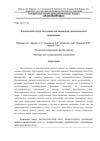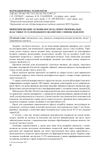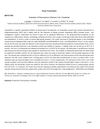 3 citations,
December 2020 in “Problemy e̊ndokrinologii”
3 citations,
December 2020 in “Problemy e̊ndokrinologii” Male hormones may make COVID-19 worse, while substances that block these hormones could lessen symptoms.
 3 citations,
September 2017 in “The journal of investigative dermatology/Journal of investigative dermatology”
3 citations,
September 2017 in “The journal of investigative dermatology/Journal of investigative dermatology” CBD can either promote or inhibit hair growth depending on the concentration used.
 2 citations,
February 2023 in “Journal of The American Academy of Dermatology”
2 citations,
February 2023 in “Journal of The American Academy of Dermatology” Scalp biopsies greatly improved diagnosis and treatment for Black women with unclear alopecia.
[object Object]  2 citations,
October 2020 in “Annals of Oncology”
2 citations,
October 2020 in “Annals of Oncology” Men may be more vulnerable to severe COVID-19 due to genetic and hormonal factors, but more research is needed.
 2 citations,
June 2012 in “Journal of Dermatological Science”
2 citations,
June 2012 in “Journal of Dermatological Science” The gene HDC is important for the development of hair follicles in newborn mice.
 1 citations,
December 2023 in “Scientific reports”
1 citations,
December 2023 in “Scientific reports” 3D microenvironments in microwells improve hair follicle stem cell behavior and hair regeneration.
 1 citations,
July 2021 in “Current Issues in Molecular Biology”
1 citations,
July 2021 in “Current Issues in Molecular Biology” Father's finasteride use may affect son's fertility and testicular function.
 February 2024 in “Agroèkoinfo”
February 2024 in “Agroèkoinfo” Environmental factors and grain products affect hair loss, with low cobalt in hair possibly predicting the condition.
Delta-opioid receptors affect skin cell circadian rhythms, possibly impacting wound healing and cancer.
 February 2023 in “Journal of clinical medicine research”
February 2023 in “Journal of clinical medicine research” Zinc acetate hydrate may help reduce fatigue and hair loss in post-COVID-19 patients.
 January 2023 in “Sibirskij medicinskij vestnik”
January 2023 in “Sibirskij medicinskij vestnik” Women with PCOS are more vulnerable to severe COVID-19 and related health issues.
[object Object]  January 2018 in “Springer eBooks”
January 2018 in “Springer eBooks” Different races and genders have unique skin and hair issues, requiring specialized care and more research for effective treatment.
 September 2017 in “Springer eBooks”
September 2017 in “Springer eBooks” Epinephrine does not significantly affect the severity of hair loss after surgery.
September 2017 in “The journal of investigative dermatology/Journal of investigative dermatology” Higher SPF sunscreens provide more DNA protection, and the form of sunscreen doesn't affect protection level.

Anionic surfactants significantly improve the foaming of minoxidil gel shampoo.
 August 2014 in “Acta Crystallographica”
August 2014 in “Acta Crystallographica” Different forms of finasteride dissolve and remain stable differently, affecting capsule quality.
 January 2011 in “Springer eBooks”
January 2011 in “Springer eBooks” Eating a balanced diet with the right vitamins and minerals is important for healthy hair, but too many supplements can be harmful.

Activin A and Follistatin affect how mouse hair follicles grow.
 September 2002 in “Dermatologic Surgery”
September 2002 in “Dermatologic Surgery” The recipient site can affect the growth and survival of transplanted hair but not its thickness.
October 2021 in “QJM: An International Journal of Medicine” Avoiding smoking, stress, obesity, and poor diet may help reduce hair loss in young Egyptian males.
January 2010 in “Chinese Journal of Aesthetic Medicine” 60 citations,
October 2020 in “Journal of Controlled Release” Curcumin nanocrystals in simple gels effectively penetrate hair follicles, but humectants can reduce this efficacy.
 44 citations,
April 2003 in “European journal of pharmaceutical sciences”
44 citations,
April 2003 in “European journal of pharmaceutical sciences” Lipophilic dyes accumulate more in hair follicles when delivered with surfactant-propylene glycol solutions.
33 citations,
June 1995 in “International journal of legal medicine” Environmental factors can greatly reduce drug levels in hair.
 14 citations,
April 2019 in “Genes”
14 citations,
April 2019 in “Genes” Researchers found a genetic region that influences the number of coat layers in dogs.
13 citations,
March 2017 in “Skin Research and Technology” Formaldehyde damages curly hair more than glyoxylic acid.
 8 citations,
January 2013 in “BioMed Research International”
8 citations,
January 2013 in “BioMed Research International” Age, gender, and hair loss affect scalp characteristics differently in young Caucasian adults.
4 citations,
July 1948 in “Experimental biology and medicine” Alcohol extraction lowers casein's nutrition, causing slower growth and hair loss in rats.
3 citations,
January 2018 in “Journal of probiotics & health” 2 citations,
August 2021 in “Journal of The American Academy of Dermatology” Exercise helps reduce skin aging, prevent psoriasis, and improve venous ulcers.




















